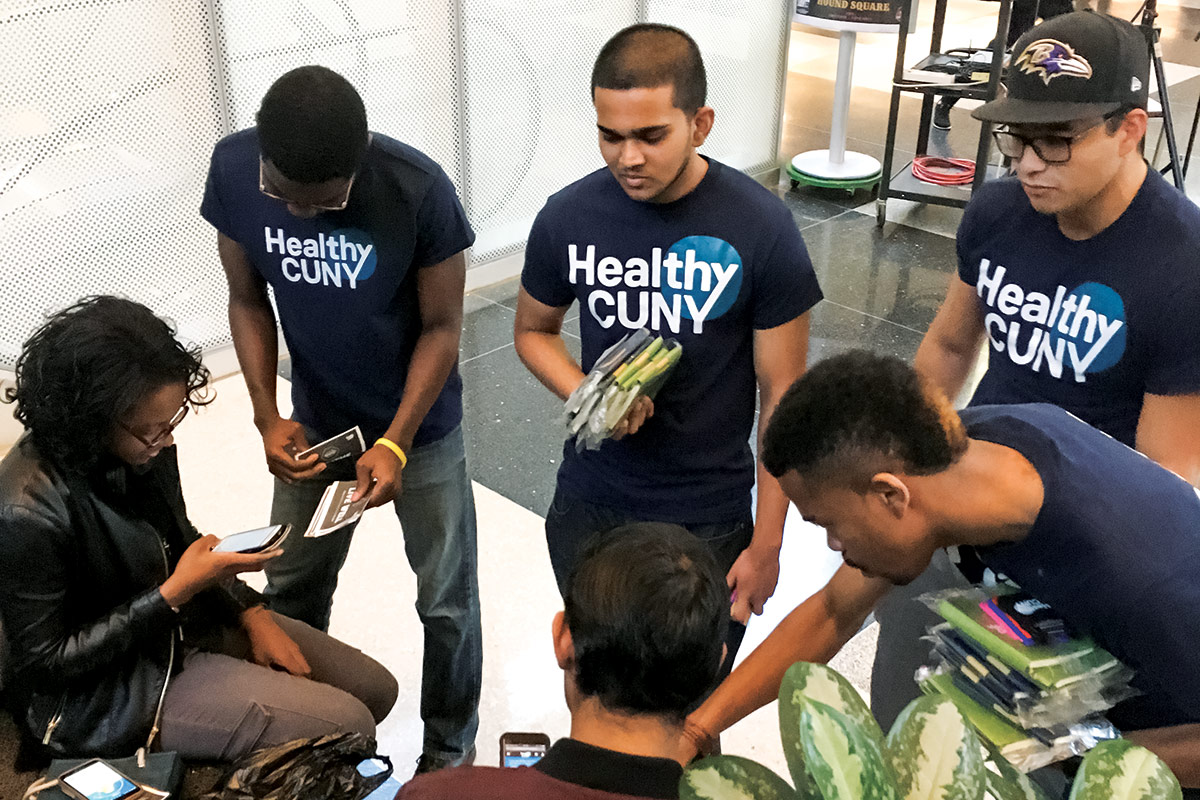
Students try out a web-based health app designed by the Healthy CUNY Tech Team.
As more college students around the nation experience depression, anxiety and high levels of stress, universities are trying new approaches to preventing problems that can make lives miserable—and interfere with academic success.
Even MTV is weighing in, with a campaign to reduce the stigma that can block students from getting the help they need. While shame associated with mental health is a reality on campuses throughout the U.S., CUNY students may face even more obstacles to getting help. Black and Latino students, women, and community college students appear to experience a greater burden of stressors compared to other college and university students around the country. And those facing poverty, high rents, racial prejudice and unsafe neighborhoods face added stress that can worsen even mild psychological problems.
For the past three years, Healthy CUNY, a university-wide initiative to reduce health problems that interfere with academic success, has been developing new approaches to helping CUNY students get help for mental health concerns. According to Healthy CUNY’s February report, Promoting Health for Academic Success: An Assessment of Opportunities at City University of New York, CUNY students experience mental health problems at worrying rates. More than 18 percent of CUNY undergraduate and community college students reported suffering from depression and 20 percent reported suffering from anxiety. The report notes that multiple stressors impose a disproportionate mental health impact on racial and ethnic minority students, women, and community college students compared to their respective peers. In focus groups led by Healthy CUNY researchers, students described the resources they turned to for help and the barriers they encountered. For some students, families, peers and professors provided the help they needed to resolve their mental health problems. Others turned to mental health professionals on their campus or in their communities. Some students, however, recounted that their families discouraged them from seeing a counselor or that they had trouble finding help on their campus.
Moreover, one third of CUNY students reported that a mental health issue interfered with schoolwork in the past 12 months. That’s an enormous challenge for a university working to improve its retention and graduation rates.
But there is good news. Two years ago, First Lady of New York City Chirlane McCray, along with the New York City Department of Health and Mental Hygiene and the Mayor’s Office, launched Thrive NYC, a comprehensive initiative designed to change the way people think about mental health—and the way the city delivers its services.
During the 2016-2017 academic year, with funding from the CUNY Office of the Chancellor, the United Hospital Fund, and Thrive NYC, Healthy CUNY reached out to thousands of students across four CUNY campuses to encourage them to seek help if they felt stressed, depressed, or anxious. This outreach included a marketing campaign, an app for use on mobile phones, and student “mental health ambassadors,” trained to help their peers get help for depression and anxiety. On two CUNY campuses in the Bronx, ambassadors directed their peers to on-campus and community resources.

At City College of New York, undergraduates in the Advertising and PR program developed posters to promote these initiatives.
“Many of our students, in developing this campaign, reflected on their own realizations about reaching out to friends and seeking help themselves,” says Gerardo Blumenkrantz, a City College marketing and communications professor who worked with the students to develop the campaign.
At the CUNY Graduate School of Public Health and Health Policy, a team of students worked with Healthy CUNY faculty and staff to develop a new app offering mental health resources—as well as assistance with sexual health, food security, and health insurance access. Two SPH faculty, Spring Cooper and Chris Palmedo, played key roles in this project as did CUNY doctoral student Sonia Gonzalez.
“Many CUNY students feel that whatever they’re going through—anxiety or depression—it will subside,” says Isabella Divilova, a Thomas Hunter honors scholar who worked on the Healthy CUNY outreach and app development team, while studying at Hunter College. “And although that may be true sometimes, the stigma that exists around mental health is keeping many students from getting important help that they actually need.”
Using a human-centered approach to designing the app, CUNY students from around the university visited CUNY campuses, introduced students to the app and invited their suggestions for improvements. The human-centered design approach meant that the app’s intended audience was involved in all aspects of app development. At John Jay College, Borough of Manhattan Community College (BMCC), Brooklyn College, Kingsborough College and Medgar Evers College, Healthy CUNY researchers used student feedback on the app to improve it.
“When I first came to college, it was extremely difficult for me. I dealt with a lot of depression” says Yasmine Subtyl, a Queens College student who worked on design team. “But when I found out that there was an app that could help, I wanted to be a part of that.”
Healthy CUNY researchers are now completing an evaluation of these demonstrations. They will use the findings to design, then launch and evaluate a more comprehensive intervention that combines the best elements of peer support and outreach, app-based information and referrals, and campus-based mental health professionals. Their ambitious goal is to ensure that in the future any CUNY student with mental health concerns can get help before the problem interferes with school.
Healthy CUNY also seeks to put CUNY at the forefront of national efforts to improve educational achievement among low-income urban college students.
“In the last decade, CUNY has developed nationally recognized models of providing our students with academic and financial support,” says Nicholas Freudenberg, Distinguished Professor of Public Health and Director of the Healthy CUNY Initiative. “In coming years, CUNY has the potential to further contribute by helping students to overcome health challenges such as depression, anxiety, lack of access to health care, sexual and reproductive health issues, and food insecurity that often undermine academic success.”













